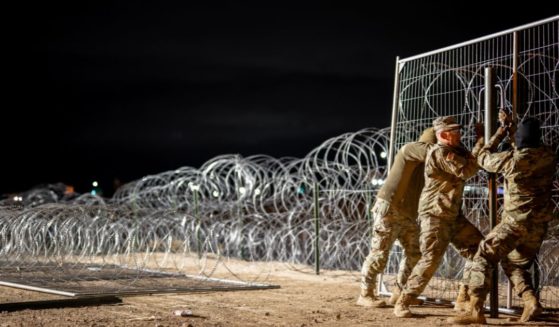Death Spiral: Right After Biden's Afghanistan Defeat, UN Proves Iran Able to Build Nuke
Just over a week ago, Afghanistan fell to the Taliban. If you thought America’s death spiral of shame would be complete once that weekend was over, however, you were wrong.
Not only has the world watched the days in between as the situation in Afghanistan grew more humiliating for the Biden administration and the United States as a whole, but on Tuesday, The Associated Press reported that the United Nations’ atomic watchdog confirmed Iran wasn’t just producing nuclear material in contravention of the 2015 nuclear agreement; it is rapidly approaching the capability of producing a nuclear weapon.
International Atomic Energy Agency head Rafael Mariano Grossi said in February “at his inspectors had confirmed that a small amount of uranium metal, 3.6 grams, had been produced at Iran’s Isfahan plant,” according to the AP.
“The production of uranium metal is prohibited by the 2015 nuclear deal known as the Joint Comprehensive Plan of Action, or JCPOA, which promises Iran economic incentives in exchange for limits on its nuclear program, and is meant to prevent Tehran from developing a nuclear bomb,” the outlet reported.
Iran, of course, says this is for its civilian nuclear program.
The remaining members of the JCPOA, however, said Iran’s progress is a “key step in the development of a nuclear weapon.”
“Iran has no credible need to produce uranium metal, which has direct relevance to nuclear weapons development,” State Department spokesman Ned Price said in a statement, the AP reported, calling it “unconstructive and inconsistent with a return to mutual compliance.”
“Such escalations will not provide Iran negotiating leverage in any renewed talks on a mutual return to JCPOA compliance and will only lead to Iran’s further isolation,” Price said.
He added that “Iran’s nuclear advances have a bearing on our view of returning to the JCPOA” in wording that suggested even the Biden administration is losing patience with Iran’s intransigence.
“We are not imposing a deadline for negotiations, but this window will not remain open indefinitely,” Price said.
The administration of former President Donald Trump initially withdrew from the JCPOA in 2018, citing the deal’s shortcomings, particularly in regard to Iran’s ability to wage conventional warfare and engage in proxy wars like the one in Yemen.
A primer on what uranium enrichment is and why it’s important, courtesy of the BBC:
Natural uranium contains about 0.7 percent of U-235, an element needed for both nuclear power and nuclear weapons.
However, centrifuges that can spin at supersonic speeds can separate U-238 from U-235 and create nuclear fuel. For commercial power plants, this is at 3 to 5 percent U-235 concentration.
As part of the JCPOA, Iran isn’t supposed to have more than 300 kilograms (660 pounds) of low-enriched uranium. It’s exceeded that stockpile — but it’s gone into more worrying territory as well.
Iran has started to enrich uranium to 20 percent purity, up to 200 grams of it. That’s quite a bit and, although not weapons-grade, it would be used in research reactors.
What’s more, smaller quantities of 60 percent enriched uranium are being produced by Iran — uranium that has no application in civil reactors or research reactors.
And then there’s the issue of “breakout time” — the amount of time necessary to acquire enough fissile material for at least one nuclear device.
In Iran’s case, back in April, experts said the country’s “breakout time” had been reduced from one year to three months.
“The US-based Arms Control Association (ACA) said that once Iran had accumulated 170kg of 20%-enriched uranium, it would be able produce one bomb’s worth, or 25kg, of uranium enriched to weapons-grade in less than two months,” the BBC reported in April.
“Iran had about 17kg of uranium enriched to 20% purity as of mid-February and it has said it plans to produce 120kg in total during 2021. It is also currently producing nine grams per hour of 60%-enriched uranium.”
In the meantime, the United States and Iran are at an impasse. The Biden administration wants to rejoin the agreement but insists Iran return to commitments under the deal. Iran, meanwhile, wants the United States to remove all sanctions first.
The Biden administration has countered that it would only remove sanctions that have to do with its nuclear program and not those that involve terrorism or human rights, among other things.
In other words, this makes a deal unlikely. Iran continues to get closer to a nuclear weapon. And it all happened as we’re dealing with the biggest blow to U.S. diplomatic power since the end of the Vietnam War, our catastrophic withdrawal from Afghanistan.
If this isn’t a death spiral of shame, it’s difficult to tell what is.
Truth and Accuracy
We are committed to truth and accuracy in all of our journalism. Read our editorial standards.
Advertise with The Western Journal and reach millions of highly engaged readers, while supporting our work. Advertise Today.












